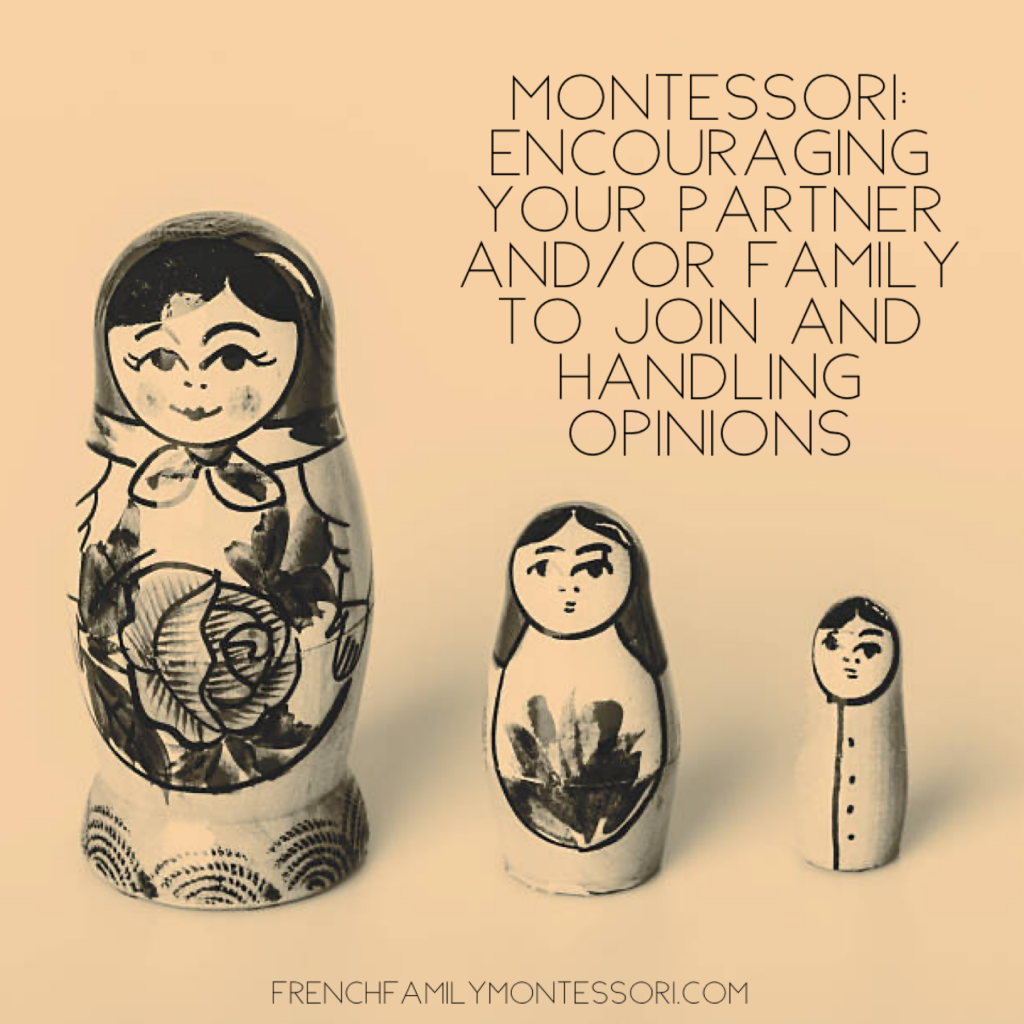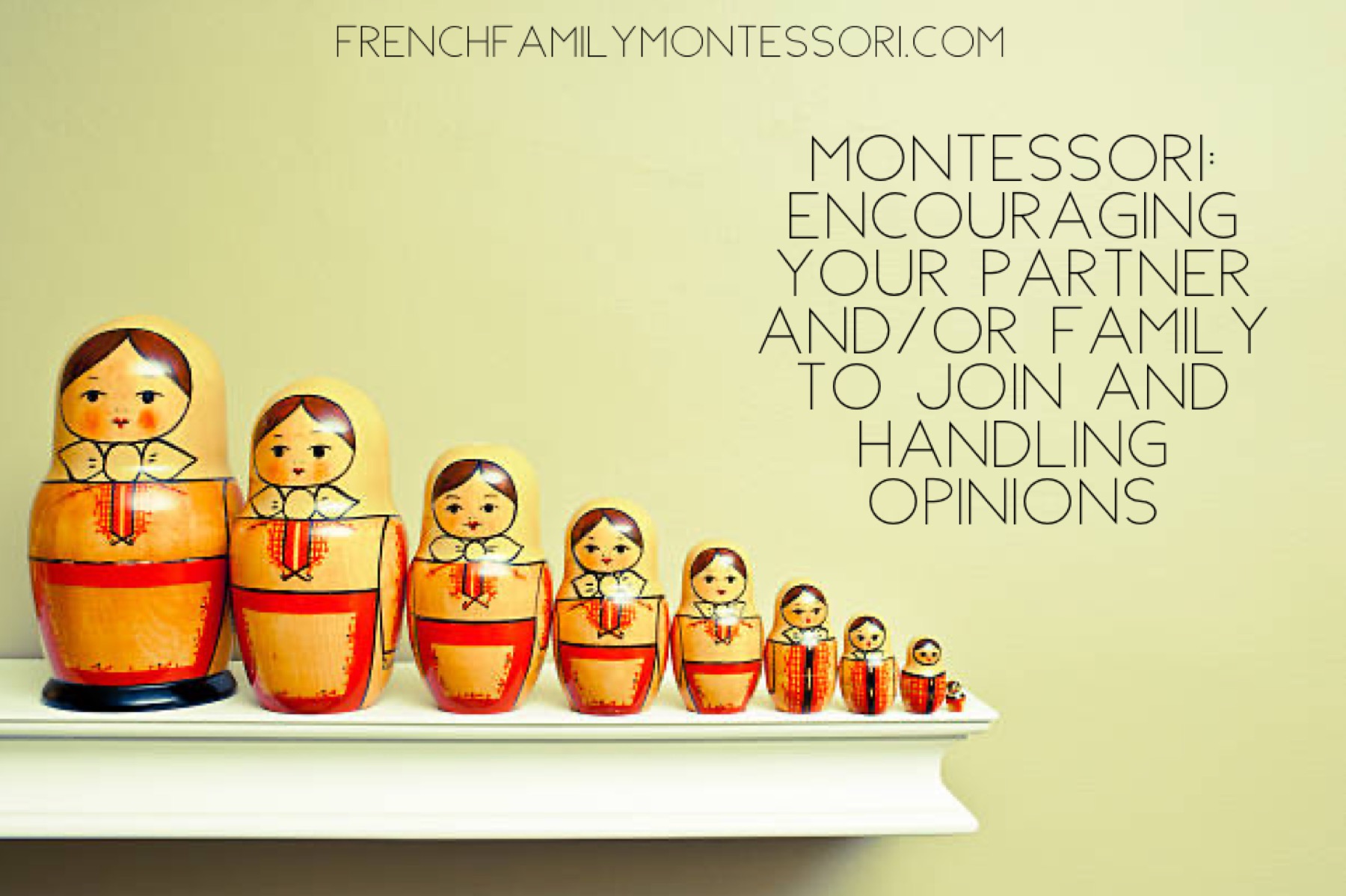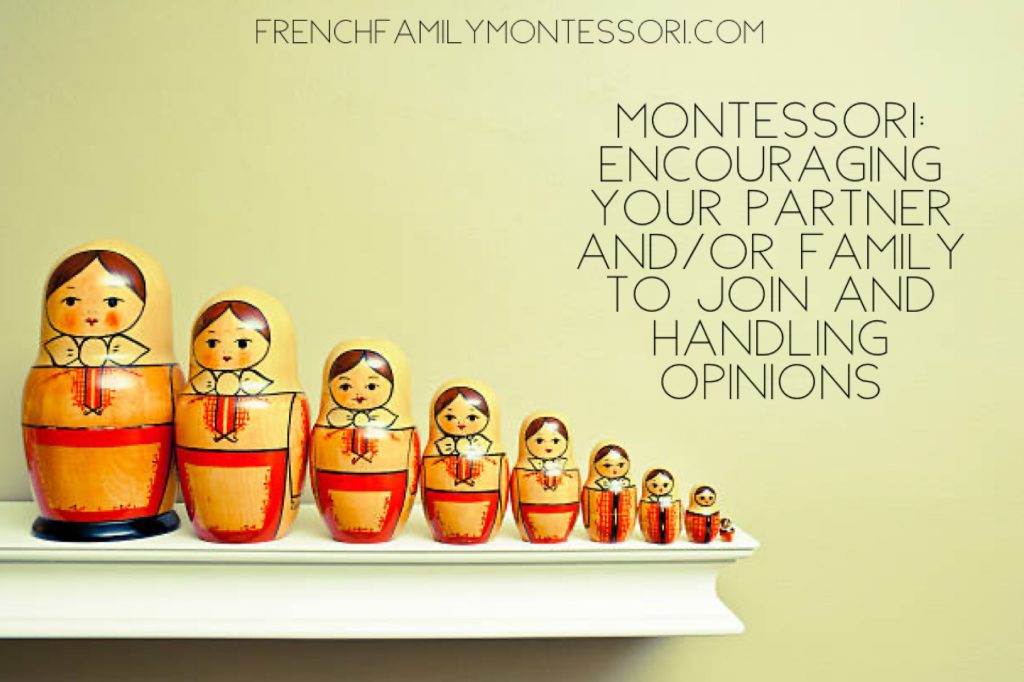
How did I get my family and Hubby on board with Montessori? I actually came across Montessori when T was 6 months old. The more I read Dr. Montessori’s work, the clearer it became that it was the best way to raise T when he was with me–and he thrived. When my husband and I first began dating, T was 3 years old. Hubby saw the effects of the Montessori method and we agreed that when we had children they would be raised the same.
Not everyone thinks about parenting styles prior to finding their lifelong partner, many, not even prior to children. So I was very fortunate in that aspect. Most who message me about this topic are coming across Montessori after they have children and wish to know how to get their partner and/or family on board. And I’m going to be completely honest, the only other person you absolutely need on board is your partner and that’s because you should always be in agreement on parenting styles with them. While it would be nice if all those in our children’s life followed the Montessori philosophy, it’s not as important as both their parents being on the same page.
So how to go about doing that:
–Make your why clear. Explain to them why you think Montessori is best. When I explained this to Hubby it was the independence that children develop, the respect for the child that Dr. Montessori spoke of, there are so many studies that support her findings, I greatly like the limited and organized environment…
–How and when are you going to incorporate this new change? If you say to your partner that they need to read ALL Dr. Montessori’s work in one month, that’s going to be more difficult to get them on board, haha. But if you explain that you’ll be in charge of shelf rotations and such, that helps prevent it from seeming overwhelming. If you explain the main points of Montessori (like respecting the child), offer to answer any question, and promise that you will be patient as they adjust–they may even be excited. A few other points you may want to cover–does everything need to happen overnight, when and what steps need to be taken, do we have to go out and buy all the things, etc? We are doing Montessori homeschooling and I did something similar with my husband. What items we needed now, will need within the next year, where I’m going to store them, and so on? Having a general plan helps.
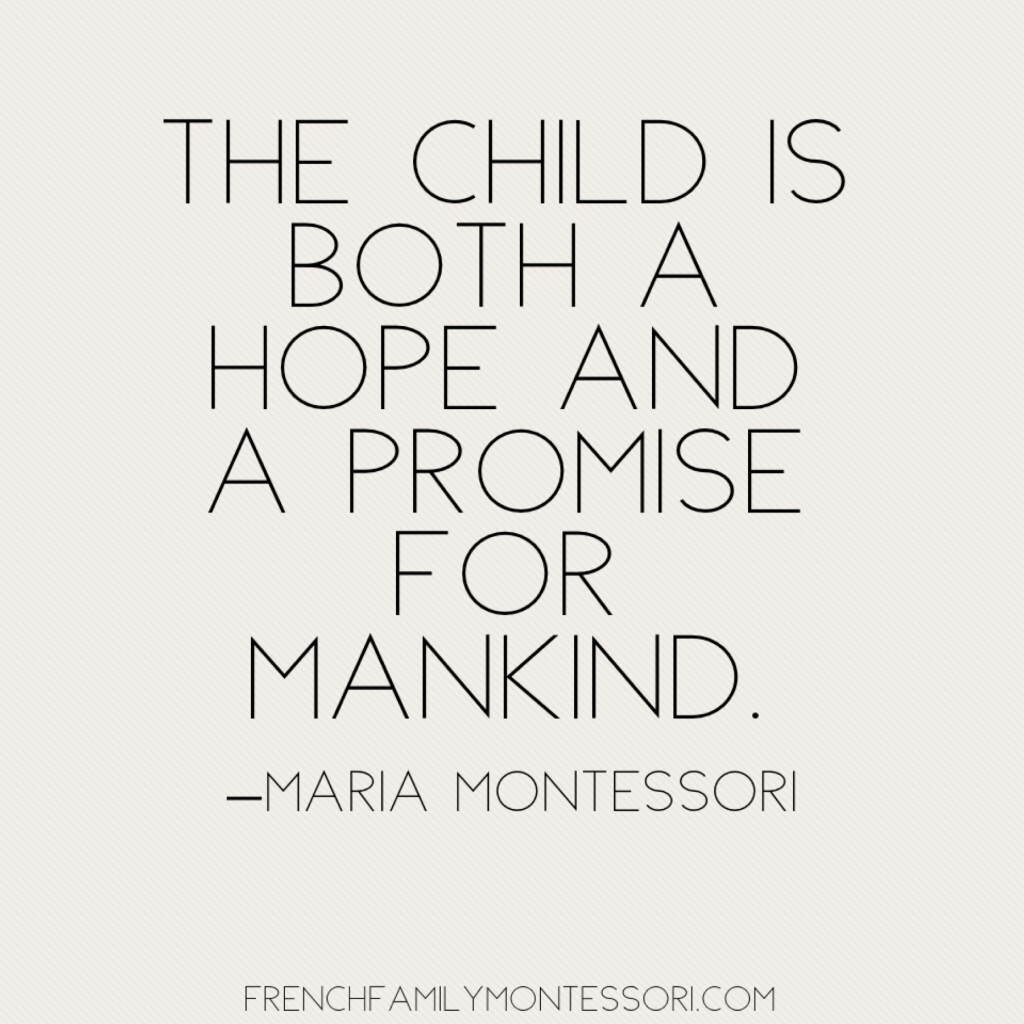
My side of the family has been exposed to Montessori because of T, so this isn’t new. But when I first started explaining certain things, back when T was a little tyke, they thought I was crazy! My grandmother just couldn’t understand why I would provide T with certain materials as he was “too young”–but you should hear her now with the girls, it’s a complete turnaround. As the saying goes: The proof is in the pudding. The only person who was really supportive was my great-grandmother, because, as she put it, “That’s how we used to do it!”
What I suggest to others, just do it! If you have done your research and have concluded that this is best for your child, then do what is best for your little one. Your family may join, try to learn, and adjust old beliefs–or they may not–but you can’t put off what you feel is best for your child waiting for others to come around.
A HUGE part in how seriously your family and friends take your parenting choices often depends on your wording. So how do we word our decisions? Blunt and clear. “We try to avoid certain toys, like plastic and those that require batteries,” versus “We don’t allow plastic toys or toys that require batteries in the house.” The first sounds like if something is really cute or some other reason, it’ll be allowed. The second wording is blunt and clear, no plastic or batteries, period.
Offer a little grace. You have to admit, the Montessori philosophy is a bit different than how many others choose to raise their children. It’s probably even different than how you were raised, I know that’s the case for both my husband and me. Be open to questions and offer to educate. When we explain certain things to family, for instance, that we don’t ‘praise’ our children, that seems rather odd. Like, how can you not tell your child you’re proud of them?! My grandmother, when I explained why we don’t praise and what we do say, now works really hard not to say, “Good job!” She tries saying things like, “Look at how you took that big step after practicing so hard,” often correctly herself when she does start to say, “Good job,” and asking questions. I find that loved ones are generally understanding and wish to respect the way we raise our children. When you do something out of the norm for others, it takes time to adjust.
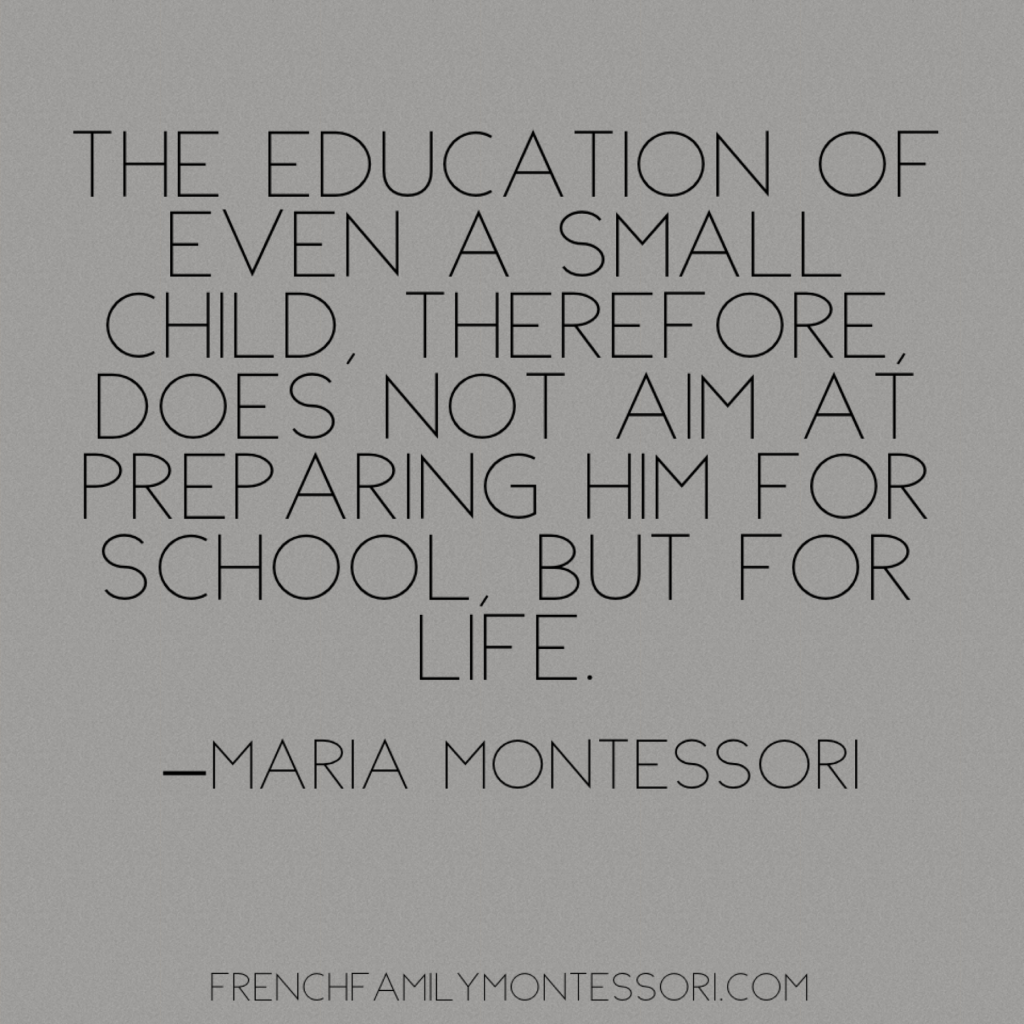
My husband’s aunt offered a basket of toys to me, during a holiday gathering at her home last year, for the girls to play with. She said she knows we prefer to avoid certain items, she wasn’t completely sure what they were and I was welcome to offer them what I saw fit. How incredibly thoughtful! I don’t need our family and friends to know what the pink tower is or what sensory periods the girls are currently in; I just want them to be respectful and not undermine our parenting style, but isn’t that really the case for all of us?
I think most of us have that one family member who completely disagrees with what we are doing and it’s almost like they learn all about Montessori just so that they can do the exact opposite, haha (I laugh, but it’s absolutely infuriating). But, since we’ve made our position clear–“We don’t allow plastic toys or toys that require batteries in the house!”–we stick to it. If they ask, I thank them again for their thoughtfulness and generosity and then remind them that we don’t allow those items in the house, so they were donated and are a blessing to someone else.
Having Autism, I have a script, of sorts, that helps make conversations and social situations easier. I thought I would share a script to help with this type of conversation, so here’s my side of an actual conversation that was had with someone. Because we all have probably experienced this conversation, or may, in some form or another, I thought I would share how I responded. Notice the words I use, kind but firm.
When I was asked about a particular noisy toy:
Me: “I want to thank you again for your generosity to the girls and thoughtfulness. As I’ve mentioned before: We don’t allow plastic or battery-operated materials in our home. So we donated it to the children’s hospital as the children receiving treatments there really need toys such as those to distract them. Your gift is such a blessing!”
When told that someone did this or that with their child and they turned out great:
Me: “That’s wonderful that you found a parenting style that worked so well for your family and your children excelled! This is what works best for ours.”
Trying to end the judgmental conversation:
Me: “While you may not agree with them, I wish to thank you for respecting our parenting decisions.”
While being polite, I make our position clear. We don’t allow certain items, we won’t be allowing them in the future either and this is how we raise our children.
Let me know in the comments if there is anything, in particular, you may want assistance in addressing. While I could go on and on, I thought it best not to turn this post into a novel, haha.
.
.
.
